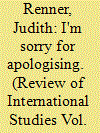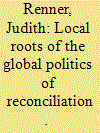| Srl | Item |
| 1 |
ID:
085512


|
|
|
|
|
| Publication |
2008.
|
| Summary/Abstract |
Croatia's foreign policy towards the ICTY and the EU has been marked by ambivalence in the last couple of years. While reluctant to hand over indicated war criminals on the one hand, Croatia has from time to time demonstrated a willingness to fulfill the demands of the international community, and in particular the EU, on the other.
The paper reflects on this seemingly inconsistent behavior and argued that Croatia's foreign policy can be better understood when one takes into account how Croatia remembers its most recent past.
|
|
|
|
|
|
|
|
|
|
|
|
|
|
|
|
| 2 |
ID:
114979


|
|
|
|
|
| Publication |
2011.
|
| Summary/Abstract |
This article inquires into the effects of public apologies. It argues that the focus of most scholars of public diplomacy or conflict resolution on the conflict solving capacity of public apologies is limited and prevents an open and responsive analysis of empirical apology processes. Drawing on speech act theory as developed by John L. Austin and some of his critics it suggests that existing apology theory should broaden its perspective and also take the perlocutionary, that is, the unintended social effects of public apologies into account. The article illustrates its theoretical argument with the example of the Czech-German apology process. The apologies issued between these countries since 1989 suggest that the conflict solving performance of the apologies was exceeded by the unintended social consequences in both, the apologising country as well as the country receiving the apology.
|
|
|
|
|
|
|
|
|
|
|
|
|
|
|
|
| 3 |
ID:
133546


|
|
|
|
|
| Publication |
2014.
|
| Summary/Abstract |
Fostering 'national reconciliation' through public truth-telling processes has become a central objective of post-conflict peacebuilding. This article critically reflects on the global politics of reconciliation by illuminating its process of emergence in the South African transition to democracy. The South African Truth and Reconciliation Commission (TRC) is commonly seen as an authoritative template for reconciliation processes around the globe, and the South African reconciliation experience often serves as a legitimising myth for the global reconciliation project. In this article, I question the intrinsic moral value of reconciliation in general as well as its interpretation in terms of public truth-telling. Drawing on the discourse theory developed by Ernesto Laclau and Chantal Mouffe, I argue that the term 'reconciliation' emerged in South Africa as an empty universal, a vague yet powerful social ideal, that could be embraced by the antagonistic parties of the ANC and NP not because of any intrinsic value, but rather because of its vagueness and semantic flexibility. The particular interpretation of reconciliation in terms of truth-telling was then articulated through the political demands raised by different societal groups, which constructed a reconciliation discourse that produced and naturalised truth-telling and healing as central components of a reconciliation policy. This discourse was eventually stabilised and institutionalised by the workings of the TRC.
|
|
|
|
|
|
|
|
|
|
|
|
|
|
|
|
| 4 |
ID:
139768


|
|
|
|
|
| Summary/Abstract |
Human rights have become a central aspect of global peace-building strategies, and are often pursued through instruments of transitional justice. In this paper I focus on the role of truth and reconciliation commissions (TRCs) for human rights in post-conflict settings and argue that the global politics of reconciliation, which is supposed to unveil the ‘truth’ about, and help to overcome, past human rights violations, serves as a vehicle that brings the human rights language to post-conflict settings. While this might be expected to be empowering for the local people, the Sierra Leonean case suggests that, here, the particular human rights narrative promoted by the TRC had two potentially depoliticising effects: first, by narrating the past conflict as a series of human rights violations while downplaying the political motives and claims that kept it going; second, by constituting the local people as the victims and perpetrators of past human rights violations who are above all in need of reconciliation and healing. The TRC’s human rights narrative thereby overwrote other subject positions held by the people, such as those of soldier, rebel, or civilian. It also neutralised the political claims held by these subjects and replaced them with the therapeutic need for reconciliation and healing.
|
|
|
|
|
|
|
|
|
|
|
|
|
|
|
|